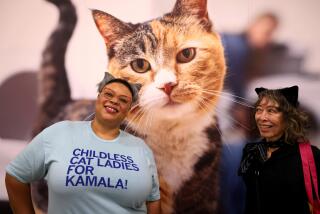Cat-Loving Millionairess Is Dead at 51
- Share via
VAN NUYS — Francine Katzenbogen, the cat-loving lottery millionairess who fought with her neighbors over construction of a $100,000, six-room guest house for a score of cats on her Studio City estate, has died.
Katzenbogen, 51, died at her Studio City home Oct. 30, apparently of an asthma attack, said her aunt, Lorraine Katzenbogen.
Although she worked tirelessly to raise money and place abandoned cats in homes, Katzenbogen was actually fiercely allergic to felines, her friends said.
“She sneezed, it was hard for her to breathe,” said Gina Rubinstein, coordinator of Cat Faire, a nonprofit organization that places abandoned cats. “In the summer the air-conditioner was not always [working] . . . she would be covered in cat hair and would sometimes have to wear a mask” to filter out the allergens.
“She gave her life for those cats,” Lorraine Katzenbogen said, adding her niece never married.
Friends who worked with Katzenbogen at a fund-raiser for animals in September, said she was not well. But Katzenbogen believed in homeopathic medicine and did not patronize medical doctors, they said. They are awaiting final autopsy results that will determine exact cause of death.
At a funeral service Wednesday night at Praiswater Meyer-Mitchell Mortuary in Van Nuys, fellow animal lovers paid tribute to the dead woman as much more than an eccentric cat lady.
Katzenbogen, who won $7 million in the New York State lottery in 1988, bought a 14-room, 5,894-square-foot mansion in Studio City the next year and spent $100,000 converting a two-story garage into the cat residence.
Called “the cathouse” by annoyed neighbors, it had six air-conditioned rooms, tile floors, scratching posts, skylights and small windows with shelves where the cats could sun themselves.
Before Katzenbogen could bring the cats to California from New York, about 50 neighbors signed a petition opposing the cat residence. Katzenbogen needed a special permit to exempt her estate from the city’s three-cat-per-residence limit, and the neighbors fought it in a series of zoning law hearings.
Katzenbogen had said she had no idea there was such a limit when she bought the estate and probably would not have moved to Los Angeles had she known about the legal problems before spending so much money to modify the “cathouse.”
“You’d think I have lions and tigers,” Katzenbogen complained.
Neighbors argued her feline palace would lower property values in the area, lure coyotes to the neighborhood to prey on the cats and cause traffic problems if the animals scampered into the street. Those who lived nearby said it would give them the willies to have batteries of cats staring at them from the small windows of their kitty castle.
The hearing officer ruled in Katzenbogen’s favor, saying it would be a hardship to forbid her to have the cats after she had gone to such expense, and noting that her 40,000-square-foot lot provided a large buffer zone from neighbors.
The hearing officer, however, added restrictions that Katzenbogen obtain a city kennel license, limit the number of cats to 20, keep them inside, dispose of cat litter daily and provide proof that all the animals had been spayed or neutered.
The special permit was to expire with the death of the last of the 20 cats.
In July 1989, with the permit secured, Katzenbogen paid Northwest Airlines $3,500 to ferry her and all the cats from New York to Los Angeles aboard a Boeing 747 cargo plane. It was the only way she could remain with them on the journey, she said. As airline workers brought the cats aboard, she supervised placement of the cages according to the cats’ friendly or hostile relationships with each other.
The veterinary bill for the felines’ checkups before leaving New York came to $4,419.
Friends at the funeral service described Katzenbogen as “vibrant” and “a dynamo.” Although she loved to shop and enjoyed fine food, her volunteer work to place abandoned cats came first, they said.
“She did the dirty work; she could’ve just written a check,” Rubinstein said. “It’s real easy to write a check.”
Rubinstein said Katzenbogen often delivered cats to homes and would take them back if she got the sense the owners would not properly care for the felines.
“Francine loved the underdog,” said friend Guy Magar, who read a eulogy written by his wife, Jacqui, who was out of town. “She always loved to help those who lacked resources to help themselves.”
On Tuesday night, friends vowed that Katzenbogen’s “fur babies” would not go to a shelter. About 15 of them have already been placed, said friend Mary Zupan. Katzenbogen also owned a few dogs and horses.
Friends believe Katzenbogen probably made arrangements for her animals in her will, though her will has not yet been probated.
More to Read
Inside the business of entertainment
The Wide Shot brings you news, analysis and insights on everything from streaming wars to production — and what it all means for the future.
You may occasionally receive promotional content from the Los Angeles Times.










